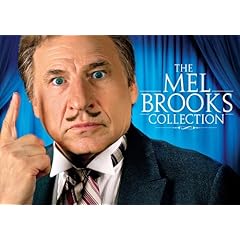 When “The Mel Brooks Collection” was released on DVD a few years ago, it was missing two key films. That oversight has been partly rectified with the inclusion of “Spaceballs” in the new Blu-ray box set, but “The Producers” is still surprisingly absent. I’m not exactly sure how you can even have a Mel Brooks collection without his directorial debut (especially when a movie he didn’t even direct made the final cut), but if you can get past its absence, this is still a great compilation for fans of his movies.
When “The Mel Brooks Collection” was released on DVD a few years ago, it was missing two key films. That oversight has been partly rectified with the inclusion of “Spaceballs” in the new Blu-ray box set, but “The Producers” is still surprisingly absent. I’m not exactly sure how you can even have a Mel Brooks collection without his directorial debut (especially when a movie he didn’t even direct made the final cut), but if you can get past its absence, this is still a great compilation for fans of his movies.
There are nine films in all, including “The Twelve Chairs,” “Blazing Saddles,” “Young Frankenstein,” “Silent Movie,” “High Anxiety,” “History of the World: Part I,” “To Be or Not to Be,” “Spaceballs,” and “Robin Hood: Men in Tights.” Each film comes with a 1080p video transfer and, with the exception of “Blazing Saddles,” a DTS-HD Master Audio 5.1 soundtrack. That’s probably better than they deserve, but it really breathes new life into the films and will hopefully earn them a new generation of fans.
Sadly, the bonus features are a pretty hit-and-miss affair, as most of them have appeared in some shape or form before. Only “High Anxiety” gets the Blu-ray exclusive “Am I Very Nervous Test,” which gauges your anxiety levels by asking you a series of psych questions during the course of the film. There are also trivia tracks for five of the nine films, and if you still haven’t seen the “Inside the Lab” picture-in-picture video track from the “Young Frankenstein” standalone Blu-ray release, it’s a cool retrospective on the making of the film that fans will definitely want to check out.
Oddly enough, the real highlight of the set is a 120-page hardcover book detailing the writer/director/actor’s remarkable career that is filled with hundreds of movie stills and behind-the-scenes photos. After all, most fans probably already own their favorite movies on some format (including a few Blu-rays), and while the new high-def transfers are certainly a nice treat, this will really make their day. Whether or not it’s worth buying the entire collection for depends on just how big of a fan you are, but at less than $100 for nine movies, it’s an amazing deal no matter how you look at it.


